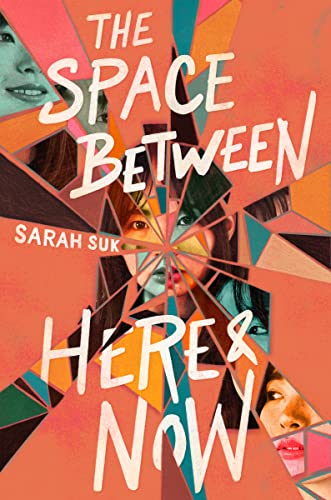The Space Between Here & Now

The Space Between Here & Now
It’s nothing I haven’t smelled before. It’s just sawdust, ordinary sawdust. I’ve walked by this room a hundred times, even took a woodworking elective last year, the woodsy smell dusting my palms, sticking to my clothes. It’s never been anything but another scent. Not a trigger.
But this time, I can tell something’s off right away.
It’s quick. A moment, half a second, a breath at most, that my mind registers what’s happening. Panic flares in my chest, but before I can do anything or so much as say a word, the door handle slips from my fingers, and I’m gone. (p. 30)
At 17, Aimee Roh lives with Sensory Time Warp Syndrome, a condition that sucks her physically into the past when she smells something linked to a memory. She is unable to live a full life when she knows she could be snatched away at any moment, and she wants treatment, but her dad assures her she will grow out of it.
But she’s not growing out of STWS – it’s getting worse – and when Aimee revisits a long memory with her mother, she feels her life teetering out of control. Her memory doesn’t fit with what her father has always told her about her mother’s disappearance when Aimee was seven, and, as her condition interferes more and more with her everyday life, Aimee grows desperate to find out the truth about her condition and its connection to her family’s past.
With the encouragement of her best friend, Nikita, Aimee travels to Korea. There, she gradually uncovers the truth about her mother and the reason Aimee keeps returning to the same memories.
In The Space Between Here and Now, Sarah Suk skillfully combines very real adolescent angst with an invented time-travel disorder that feels believable. Aimee’s experience of a disruptive condition, along with her support network of counsellors, doctors, family and friends, parallels that of very real disorders. Aimee researches her STWS online and finds online support groups, “meet-ups”, forums and advice posts. Her results provide realistic background information on her illness, to the point where the syndrome seems quite possible.
The time-travel syndrome also works effectively as a metaphor for confronting and accepting the uncertain truth of memory. Many can relate to the brain-stem blast of a smell from the past; Aimee’s condition makes the memory a physical experience which feels almost possible. Like Aimee, many young people must confront their assumptions and the half-truths with which they have been raised. Aimee’s experience may be fantasy, but the real-world implications and consequences are authentic.
Aimee’s Appa, her father, is reluctant to talk – about her condition, about her mother’s disappearance, or about a referral to a specialist. In their painful silence, they grow apart, and their formerly close relationship is fraught with unspoken feelings. Aimee’s condition might be fictional, but the results of it are familiar. Like many young people, she longs to talk openly with her father. She is tired of being identified by what’s wrong with her, and she wants to make peace with her memories.
A highlight of the novel is Aimee’s sensory experience of Korea and the vibrant portrayal of Korean life. With her aunt in Seoul, Aimee reconnects with the sights, sounds, tastes and smells of her culture. The descriptions of food alone make the book worth a read, a gustatory journey reminiscent of Crying in H Mart.
Full of vivid detail, the writing remains quick and compelling. As Aimee unravels the true story of her parents’ meeting, marriage and emigration to Canada, she is aided by the handsome Junho, and her search is sweetened by romance. When Aimee’s father arrives in Korea unexpectedly, the strands of her life begin to weave together, and she must make bold choices to stay connected to the present. The painful truth about her mother forces her to deal with grief, the concept of family and the power of memory to unite and divide.
The Space Between Here and Now is an imaginative, poignantly written portrayal of a courageous young woman finding her true self.
Wendy Phillips is a former teacher-librarian. She is the author of the Governor General's Literary Award-winning YA novel, Fishtailing and the White Pine Award nominated novel, Baggage.
